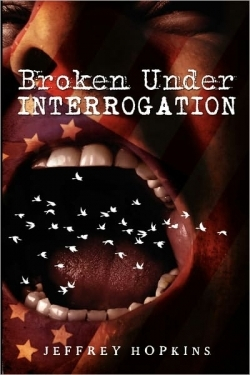Broken Under Interrogation
Jeffrey M. Hopkins, a veteran of Operation Iraqi Freedom, questions who is evil and the operations of the US military in his debut novel, Broken Under Interrogation. This sprawling epic achieves its twin aims by examining the past and present of protagonist John Powers. In the novel’s present, 2012, the depressed and angry Powers is apprehended by the Gestapo-like police, accused of torturing and killing twenty-five drug dealers with his friend and fellow Iraqi veteran, Mike Miller. Interspersed among scenes of John’s interrogation are flashbacks to his entry into the military, his career as a counterintelligence officer, and the killings he carried out with Mike following his questionable military discharge. Readers get to know John, Mike, and their victims as humans so that the violence perpetrated on the characters makes readers ask if torturers should brutalize other tormentors in the name of security. What’s more, the novel shows how the official organizations of the police and the military justify their brutalization by having rules for torture—interrogation—and making the process highly efficient. However, Hopkins reiterates that all these guidelines and efficacy do nothing to minimize the human toll of torture: the deaths of the victims and the guilt experienced by perpetrators like John. “Who are the evil people?“one character asks another. Broken Under Interrogation is a harrowing examination of the layers of wickedness in the human soul, with echoes of 1984 and A Clockwork Orange.
The analysis and ultimate indictment of our nation’s military machine is trenchant and astutely observed. For example, Hopkins contends basic training is just a game to figure out and that the poor are refusing to enlist in the military—once a way for them to join the middle class—for fear of being deployed to a danger zone. Shrewd assertions such as these convince civilian readers that military veteran Hopkins is truly an authority on this subject.
Unfortunately, the author’s structural choices and grammatical gaffes blunt the novel’s impact. Readers don’t understand why John is being held prisoner until near the end of the book in Part 2, when the crimes he committed with Mike are described in detail. More mention of these acts in Part 1 would have made readers feel the book was gearing up for something. Moreover, transitions between the book’s past and present are choppy and abrupt, leaving the reader to reorient themselves to each new section. Grammatically, Hopkins favors protracted sentences held together by comma splices, and improper use of apostrophes. Yet, despite its flaws, Broken Under Interrogation remains a valuable philosophical look at war, the military, and the frailties of human nature.
Reviewed by
Jill Allen
Disclosure: This article is not an endorsement, but a review. The publisher of this book provided free copies of the book and paid a small fee to have their book reviewed by a professional reviewer. Foreword Reviews and Clarion Reviews make no guarantee that the publisher will receive a positive review. Foreword Magazine, Inc. is disclosing this in accordance with the Federal Trade Commission’s 16 CFR, Part 255.

